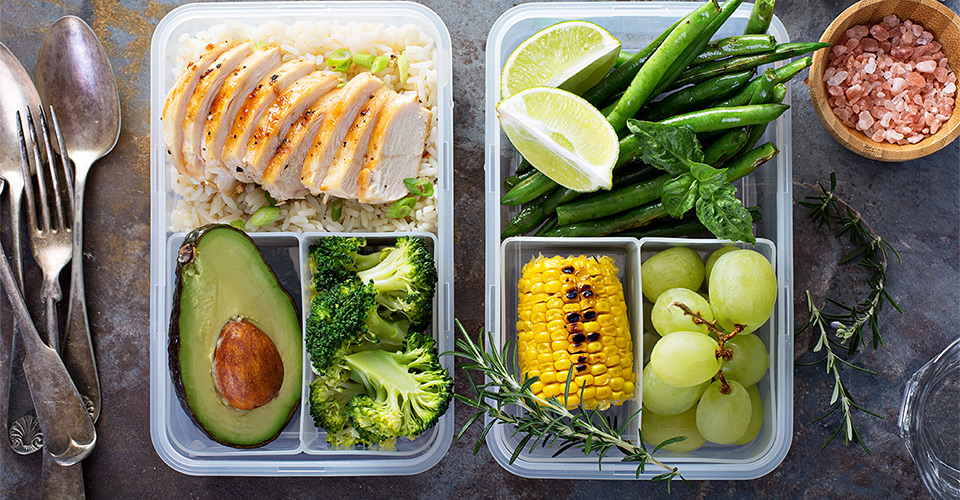- HIITCore Fitness | Braintree & Burlington, MA
- (781) 780-5577
- info@hiitcorefitness.com

Meal Prep 101
By Brianna Laurila, RD, LDN
Picture this: you get home from a long day of work and a successful HIITCore workout and you are starved! What’s your plan? Like any busy person, you’d probably shoot right to a quick calorie-dense, nutrient-lacking, non-substantial “meal.” Don’t worry; you’re definitely not the only one! What tends to be the hardest part of starting a fitness journey or continuing an ongoing healthy lifestyle is determining what foods to put into your body. Choosing the right foods to fuel your body and improve workout sessions will help fully activate your strength from within.
Imagine being able to avoid those easy frozen dinners or tempting take-out and having a meal ready to go. Sounds far fetched, right? Wrong! This is where the infamous term, Meal Prep, comes into play. Meal prep allows you to prepare meals ahead of time so you don’t need to make quick or unhealthy decisions at meal times. All the work will be done in advance, leaving you to enjoy your perfectly prepared meals.
Before you get scared away at the thought of preparing a week worth of meals, let’s go over the benefits:
Money Saver: the most compelling reason to start meal prepping is the amount of money you can save. Eating out, on average, is much more expensive than eating at home. Think about it: a daily fast food meal usually costs about $6. If you were to order fast food five days a week, that’s $30 a week and $1,560 a year! Not to mention going to a sit down restaurant and spending about $20 on a meal for one 5 days a week is a total of $100 and $5,200 a year!
Time Saver: Although you will have to dedicate a few hours one day to make meals, meal prep allows you to save time each day to focus on other important aspects of life. Meal prep eliminates daily cooking time, restaurant time, and saves time on deciding what to eat. The more you meal prep, the easier it will become!
Stay on track: Having healthy, nutrient-packed meals prepared and ready to go will prevent you from making quick, mindless meal decisions. In turn, each meal will bring you closer to your health and fitness goal, rather than setting you back.
Now that the benefits have perked your interested, here are some steps to begin:
Break Out the Calendar: Use a calendar to determine how many meals you will need for the upcoming week. You can prepare breakfasts, lunches, and dinners. Or you can determine which meal you have the toughest time with. For example, if your weak-spot is lunch because you tend to order out with coworkers, make that your main focus to begin meal prep.
Create a Menu: Now that you know how many meals to plan for, it’s time to plan what your meals will consist of. This is the perfect opportunity to ensure nutritious and balanced meals to fuel your body and stay on track. Include lean proteins (about 30-40 grams per meal), healthy fats (about 15-20 grams per meal), and healthy, whole-grain carbohydrates (about 50-60 grams per meal). When planning your menu, think about ways to use the same ingredients in multiple recipes. For example, you can cut chicken breasts into cubes for a stir-fry, or slice thin for fajitas, or bake whole and toss on a salad.
Grocery Shopping: With your menu in hand, make an organized grocery list for a stress-less trip. To save even more money, you may want to peak at the grocery flier for sales and coupons.
Prep Away: Pick a day that works best for you to block out some time to prep your meals. The best day would be one before your workweek starts. For example, a Sunday prep day would be best for a Monday through Friday workweek. On your chosen day, bake that protein, steam those veggies, and boil that brown rice. Once your food is cooked, pack your food into storage containers for easy grab and go access. For meals that include wraps, sandwiches or salads, you may want to assemble the night before consumption to avoid an unappetizing, soggy meal.
Congratulations! You have officially completed Meal Prep 101 and are fully prepared to start meal prepping and improving your daily diet. If this all still seems a bit much, start small. Preparing a meal ahead of time even for a couple of meals a week is still better than none at all. All healthy habits come with time; you just need to start!
(Remember to take into consideration your own food allergies/intolerances, gastrointestinal disorders, medical history and diagnoses, and body composition goals. It is always recommended to collaborate with a physician, trainer, and dietitian for optimal performance and health management.)



